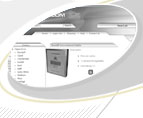Search Engine Optimization and web site promoution
Welcome to Solovat, expert in search engine optimization, Internet marketing and website promotion.
We also offer quality service for those who wants a web presence on the web and in 2 major search engines on the web (Google, Yahoo).
Learn how to prepare your site for the search engines and how to get Top Rankings in Search Engines. Read about the use of META tags and the importance of having keywords present on your site.
We have composed a small guide about Internet marketing and website promotion where you can read about different tactics to increase your website traffic.
Step 0 - Make sure your site is useful!
I'm always amazed by how many people miss this simple concept. They spend a
huge amount of time trying to get good search engine rankings and lots of
visitors, and then what do the visitors find? A poorly designed, badly
written website. If there's one bit of advice I wish I could drum into
everyone who visits this site, it is this:
"It isn't how many 'hits' you get, but how many 'sales' you make."
Making your pages "people-friendly" is as important as making them
"search-engine" friendly. It's usually much easier to double the
effectiveness of your website than it is to double your traffic, and the
bottom line result is the same. At the bottom of this article, I'll give you
some advice on how to do that.
But for now, let's talk about what you can do to help out the search
engines.
Step 1 - Determine your Key Phrases
People get obsessive about their key words. This is wrong. It is difficult
if not impossible to get high rankings based on keywords. Instead, you need
to think about key phrases.
The easiest way to do this is ask yourself "what would someone trying to
find me type in when they search?" Make a list of these. Try them out on the
search engines -- pretend to be someone looking for your product or service.
If your business is geographically restricted, then your keyphrases should
reflect this. For example, if you are a a real-estate broker in Wilmington,
North Carolina, then the key phrase "buying real estate" is a waste of time;
instead, the more specific phrase "buying real estate in wilmington north
carolina" is what you want to be thinking about.
Think about variations on the key phrases and write them down. Continuing
with our example:
- real estate in wilmington north carolina
- real estate brokers in wilmington north carolina
- buying real estate in wilmington north carolina
- selling real estate in wilmington north carolina
- renting real estate in wilmington north carolina
- home buying in wilmington north carolina
- house buying in wilmington north carolina
- selling a house in wilmington north carolina
- renting a house in wilmington north carolina
- renting an apartment in wilmington north carolina
- apartment renting in wilmington north carolina
- real estate brokers in wilmington nc
- buying real estate in wilmington nc
- selling real estate in wilmington nc
- renting real estate in wilmington nc
- home buying in wilmington nc
- house buying in wilmington nc
- selling a house in wilmington nc
- renting a house in wilmington nc
- renting an apartment in wilmington nc
- apartment renting in wilmington nc
The above is only a partial list, but you get the idea. You can also get a
good idea of what keyphrases and page design techniques work well by looking
at other pages that do well in the searches you've tried. Note that this
sample list is just a list of possible keyphrases -- we're not going to use
all of them because we won't have room.
Using our example of selling real estate in Wilmington, NC and entering
"real estate" into the Google tool, I found that in October 2001, the broad
keyphrase "real estate" was searched for 67016 times (on Google). However,
you'd never want to target that keyphrase, because you don't care if someone
in Kalamazoo wants real estate; you're only interested in people who want
houses in Wilmington. Looking down the list of results, I found that "north
carolina real estate" got 489 searches. That's a possibility. Doing a search
suggestion on "wilmington" revealed several hundred hits on "wilmington
north carolina," "wilmington nc" and related topics. Zooming in even
further, getting a suggestion on "wilmington real" found 36 hits on specific
queries related to real estate in wilmington, NC. These queries obviously
don't get a huge amount of traffic, but because they're so focused on what
you're trying to do, they're often the best ones to target.
My advice is to use the Google tool to get a rough idea what your keyphrases
should be (and find ones you might not have thought about), and then use
WordTracker to determine which ones you really should be targeting - and
(this is key!) to rank them in order of importance.
OK. At this point, you know what your best keyphrases are. You've got your
list. You've checked it twice. Now it's time to use it!
Step 2 - Crafting your {TITLE} tag
Most people make the mistake of using a page title that's good for people
but lousy for the search engines. Big mistake. A title like "Bill Phillips -
Real Estate Broker" is a disaster! The golden rule is this: All your most
important keyphrases should be in the TITLE tag. So what you do is look at
your keyphrases, make a list of all the important words, and create a title
tag that uses them. Also, keep in mind that browsers only display the first
few words of a title tag (whatever fits into the title bar of the window).
So while the first sentence of your title tag should be "human readable",
the rest can be just a list of keyphrases.
There is some debate as to whether a very long title tag is a good thing or
a bad thing when it comes to search engines. Some people are concerned that
a very long title tag might result in the search engines deciding the page
is a "spam page." I'm waffling on this issue right now. Based on the
available (scanty!) evidence, my advice is to keep the title between 15 and
20 words. But you might want to try longer title tags on some of your pages,
just to see what happens! So Bill Phillips might have a title that looks
like this:
{ TITLE }Real Estate in Wilmington, North Carolina - New Hanover County
- Buying Selling Renting Houses Homes Apartments Commercial Property
Office{ /TITLE }
The reason for this is that the three most important places to have
keyphrases and phrases are your title tag, your meta tags, and your first
paragraph. You want them to all contain the same important words; this
increases your keyphrase density and improves your rankings.
next page
The article below has been reprinted with permission from
www.selfpromotion.com.
| 






